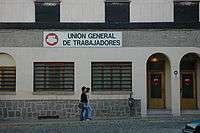Unión General de Trabajadores
 | |
| Full name | Workers' General Union |
|---|---|
| Native name | Unión General de Trabajadores |
| Founded | 1888 |
| Members |
1,057,700 members. 97,145 (34.8%) union representatives.[1] |
| Affiliation | ITUC, ETUC |
| Key people | Cándido Méndez, general secretary |
| Office location | Madrid, Spain |
| Country | Spain |
| Website | www.ugt.es |
The Unión General de Trabajadores (UGT, General Union of Workers) is a major Spanish trade union, historically affiliated with the Spanish Socialist Workers' Party (PSOE).
History
The UGT was founded 12 August 1888 by Pablo Iglesias Posse (b.Ferrol 1850- d.Madrid 1925) in Mataró (Barcelona), with Marxist socialism as its ideological basis, despite its statutory apolitical status. Until its nineteenth Congress in 1920, it did not consider class struggle as a basic principle of trade union action. Being a member of the UGT implies an affiliation to the PSOE and vice versa.
During World War I era, the UGT followed a tactical line of close relationship and unity of action with the Confederación Nacional del Trabajo (CNT, National Labour Confederation). This era came to a sudden end with the advent of the dictatorship of Miguel Primo de Rivera, who gave a legal monopoly on labor organizing to his own government-sponsored union. While the CNT opted for a radical confrontation with the regime, and were prohibited on this account, the UGT, although in disagreement with the dictatorship, adopted a collaborative attitude in order to continue to operate legally. The radicalization during the period of the Second Spanish Republic of the wing led by Francisco Largo Caballero, when the UGT surpassed a million members, and the bloody breakout of the Spanish Civil War deepened the internal fissures that resulted in the departure of Largo Caballero from the position of UGT secretary general in 1937.
General Francisco Franco confined the UGT to exile and clandestinity after his victory in the Spanish Civil War until his death in 1975. The Union emerged from secrecy during the democratic transition after Franco's death, as did the communist Workers' Commissions (Comisiones Obreras, CCOO). The UGT and CCOO, between them, constitute the major avenues for workers' representation in today's Spain, with the anarcho-syndicalist Confederación General del Trabajo (CGT) a distant third.
Objectives
The UGT declares itself to be an institution of productive workers, organized along lines of trades and liberal professions, which respects freedom of thought, leading toward the transformation of the society, in order to establish it on the basis of social justice, equality and solidarity.
Federations and foundations
_01.jpg)

- Metal and Construction (Metal, Construcción y Afines - MCA)
- Federation of Transport, Communication and Sea (Federación de Transportes, Comunicaciones y Mar - TCM)
- Federation of Commerce, Catering-Tourism and Games (Federación de Comercio, Hostelería-Turismo y Juego - FCHTJ)
- Federation of Public Services (Federación de Servicios Públicos - FSP)
- Pensioners's Union (Unión de Jubilados y Pensionistas - UJP)
- Federation of Agriculture and Food Processing (Federación Agroalimentaria-FTA)
- Federation of Light Industries (Federación de Industrias Afines - FIA)
- Federation of Education Workers (Federación de Trabajadores de la Enseñanza - FETE)
- Federation of Services (Federación de Servicios - FeS)
- Independent Workers's Union (Unión de Trabajadores por Cuenta Propia - UTCP)
- Small Farmers's Union (Unión de pequeños Agricultures - UPA)
- Professionals and Autonomous Workers' Union (Unión de Profesionales y Trabajadores Autónomos - UPTA)
The Unión de Trabajadores por Cuenta Propia (UTCP, Union of Self-Employed Workers) is not an organism of UGT. It is a bottom-up association, formed by the farmers' union UPA and the professional and autonomous workers' union, UPTA, who united in this manner to enhance their representation inside the Union and to form a united front on factional issues where they have common interests.
See also
- Pablo Iglesias, founder of both the UGT and the Spanish Socialist Workers' Party
- Ferrol, birthplace of both Francisco Franco (1892) and Pablo Iglesias (1850)
References
- Much of the content of this article comes from the equivalent Spanish-language Wikipedia article, accessed April 11, 2005.
External links
| Wikimedia Commons has media related to Unión General de Trabajadores. |
- UGT - Unión General de Trabajadores - UGT website
- UGT - Unión General de Trabajadores-Federación Española Trabajadores de la Enseñanza de Castilla y León - FETE-UGT CyL website
- Portal del Transporte de la Sección Sindical de UGT
- Unió General de Treballadors de Catalunya Catalonian autonomous region's UGT (from Wikipedia in Catalan)
- Small history of the UGT in Catalonia Workers at the Center of Mataró and the 1888 Congress of the Barcelona.
- História del sindicato – History of the union